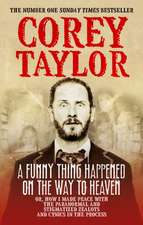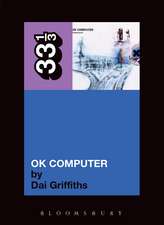Liz Phair's Exile in Guyville: 33 1/3
Autor Gina Arnolden Limba Engleză Paperback – 16 iul 2014
Din seria 33 1/3
- 39%
 Preț: 47.02 lei
Preț: 47.02 lei - 39%
 Preț: 46.92 lei
Preț: 46.92 lei - 40%
 Preț: 46.46 lei
Preț: 46.46 lei - 40%
 Preț: 46.65 lei
Preț: 46.65 lei - 39%
 Preț: 46.74 lei
Preț: 46.74 lei - 39%
 Preț: 47.09 lei
Preț: 47.09 lei - 40%
 Preț: 46.29 lei
Preț: 46.29 lei - 39%
 Preț: 46.74 lei
Preț: 46.74 lei - 39%
 Preț: 47.19 lei
Preț: 47.19 lei - 39%
 Preț: 46.74 lei
Preț: 46.74 lei - 39%
 Preț: 47.62 lei
Preț: 47.62 lei - 40%
 Preț: 46.39 lei
Preț: 46.39 lei - 39%
 Preț: 46.92 lei
Preț: 46.92 lei - 39%
 Preț: 46.74 lei
Preț: 46.74 lei - 40%
 Preț: 46.56 lei
Preț: 46.56 lei - 40%
 Preț: 46.46 lei
Preț: 46.46 lei - 39%
 Preț: 46.84 lei
Preț: 46.84 lei - 40%
 Preț: 46.29 lei
Preț: 46.29 lei - 40%
 Preț: 46.56 lei
Preț: 46.56 lei - 40%
 Preț: 46.29 lei
Preț: 46.29 lei - 39%
 Preț: 46.92 lei
Preț: 46.92 lei - 39%
 Preț: 47.53 lei
Preț: 47.53 lei - 39%
 Preț: 46.74 lei
Preț: 46.74 lei - 39%
 Preț: 47.62 lei
Preț: 47.62 lei - 39%
 Preț: 46.92 lei
Preț: 46.92 lei - 39%
 Preț: 47.27 lei
Preț: 47.27 lei - 40%
 Preț: 46.39 lei
Preț: 46.39 lei - 40%
 Preț: 46.29 lei
Preț: 46.29 lei - 39%
 Preț: 46.74 lei
Preț: 46.74 lei - 39%
 Preț: 47.62 lei
Preț: 47.62 lei - 40%
 Preț: 46.02 lei
Preț: 46.02 lei - 39%
 Preț: 47.44 lei
Preț: 47.44 lei - 40%
 Preț: 46.39 lei
Preț: 46.39 lei - 39%
 Preț: 46.92 lei
Preț: 46.92 lei - 39%
 Preț: 47.09 lei
Preț: 47.09 lei - 39%
 Preț: 46.74 lei
Preț: 46.74 lei - 39%
 Preț: 47.19 lei
Preț: 47.19 lei - 39%
 Preț: 46.74 lei
Preț: 46.74 lei - 39%
 Preț: 46.74 lei
Preț: 46.74 lei - 39%
 Preț: 46.74 lei
Preț: 46.74 lei - 39%
 Preț: 46.74 lei
Preț: 46.74 lei - 39%
 Preț: 46.74 lei
Preț: 46.74 lei - 40%
 Preț: 46.65 lei
Preț: 46.65 lei - 39%
 Preț: 47.19 lei
Preț: 47.19 lei - 40%
 Preț: 46.29 lei
Preț: 46.29 lei - 39%
 Preț: 46.74 lei
Preț: 46.74 lei - 40%
 Preț: 46.56 lei
Preț: 46.56 lei - 40%
 Preț: 46.46 lei
Preț: 46.46 lei - 40%
 Preț: 46.56 lei
Preț: 46.56 lei - 39%
 Preț: 46.74 lei
Preț: 46.74 lei
Preț: 46.74 lei
Preț vechi: 77.18 lei
-39% Nou
Puncte Express: 70
Preț estimativ în valută:
8.94€ • 9.30$ • 7.38£
8.94€ • 9.30$ • 7.38£
Carte disponibilă
Livrare economică 24 martie-07 aprilie
Preluare comenzi: 021 569.72.76
Specificații
ISBN-13: 9781441162571
ISBN-10: 1441162577
Pagini: 136
Dimensiuni: 121 x 165 x 13 mm
Greutate: 0.14 kg
Editura: Bloomsbury Publishing
Colecția Bloomsbury Academic
Seria 33 1/3
Locul publicării:New York, United States
ISBN-10: 1441162577
Pagini: 136
Dimensiuni: 121 x 165 x 13 mm
Greutate: 0.14 kg
Editura: Bloomsbury Publishing
Colecția Bloomsbury Academic
Seria 33 1/3
Locul publicării:New York, United States
Caracteristici
Gina Arnold was a highly successful rock writer when this album was released in the early 90s; she's now a scholar and will bring that perspective to an album in which she's still deeply invested
Notă biografică
Gina Arnold is the author of Route 666: On the Road to Nirvana and Kiss This: Punk in the Present Tense. She has written for Spin, Rolling Stone, and the Village Voice. Currently, she is finishing up her PhD at Stanford University.
Cuprins
Introduction: Written in my Seoul Chapter 1: Guvyille as Ghostworld Chapter 2: Sonic Pleasure and Narrative rock criticism Chapter 3: My Mixed Feelings Chapter 4: Exile State of Mind Works Cited
Recenzii
I found this book to be, like Ms. Phair's album, charming and brave and unexpectedly moving. The author is excellent on so many things, including how the power of Ms. Phair's songs grows from their grainy details, quotidian observations that other rockers so rarely give us, about things like housework and roommates and 'what is was like to feel voiceless and powerless in a nightclub, on a road trip, or during sexual intercourse.
Arnold is a wonderful writer: fearless, precise, full of doubt, never taking anything for granted. She's one of the few people left on the planet who uses presently correctly, which can create its own thrill. Going back to Liz Phair's once notorious, now often forgotten, absurdly in-your-face ambitious first album-'a story about a girl and a time and a place,' the indie-rock world of Wicker Park, in Chicago, in the early 1990s, but in Phair's hands a story told with such heart that you need no such details to catch every shade of meaning and emotion-Arnold has written a book about the past ('when dinosaurs, as personified by Dinosaur Jr., ruled the earth'), its follies and crimes ('Every past is worth condemning,' Arnold quotes Nietzsche, and then puts the words to work), and the idea of an imagined community that the past leaves behind ('Often I think I am a better informed citizen of Middlemarch, Bartsetshire,' Arnold says, 'than I am of San Francisco'). And it's about what it means for a young woman to simultaneously take on both everyone in her town and take down the album that sums up everything that everyone in her town would like to sound like, look like, act like, be-to take down a whole way of being in the world.
Writing at length about two themes - 'third-wave feminism' and the changing nature of indie music over the past twenty years - requires laborious research, cogent arguments, and logical grounding from start to finish. Doing so in the context of one record makes the task even more difficult. I can say, having reviewed many scholarly articles in my time, that Arnold passes the test with flying colors. The book is well cited, filled (but not overwrought) with pertinent facts, and her points are structured in a way that just make sense. In a word, the book is smart.
Mentioned in Harper's Bazaar
Provocative in all the right places, persuasively argued and certainly among the most professional of the series. It reminds me how much my thinking about gender and sexuality has benefitted from reading women's testimonials to the emotional power of Guyville. It also reminds me how, to this day, I would drink Liz Phair's bathwater.
Arnold's book puts Phair in her proper place as the patron saint of f**k you. Because, in the end, Phair had the last laugh. Guyville is no more. It has been laid waste, in part, by the corporate interests that poached and commodified indie rock's talent (Phair included), and finally blasted into oblivion by technology. The critic, like those denizens of Guyville, no longer needs to impress us with her encyclopedic knowledge of a musical act, or lay forth great truths and judgments for us to accept without question. Rather, she can engage in a more lyrical form of storytelling, picking apart at the edges of a work of art, and letting biography and theory bubble forth as need be, in order to reveal a particular, individual relationship. In this way, Arnold's book not only documents a lost world. By presenting an engaging and enlightening example of criticism in the post-critical age, it also points a way forward.
Arnold is a wonderful writer: fearless, precise, full of doubt, never taking anything for granted. She's one of the few people left on the planet who uses presently correctly, which can create its own thrill. Going back to Liz Phair's once notorious, now often forgotten, absurdly in-your-face ambitious first album-'a story about a girl and a time and a place,' the indie-rock world of Wicker Park, in Chicago, in the early 1990s, but in Phair's hands a story told with such heart that you need no such details to catch every shade of meaning and emotion-Arnold has written a book about the past ('when dinosaurs, as personified by Dinosaur Jr., ruled the earth'), its follies and crimes ('Every past is worth condemning,' Arnold quotes Nietzsche, and then puts the words to work), and the idea of an imagined community that the past leaves behind ('Often I think I am a better informed citizen of Middlemarch, Bartsetshire,' Arnold says, 'than I am of San Francisco'). And it's about what it means for a young woman to simultaneously take on both everyone in her town and take down the album that sums up everything that everyone in her town would like to sound like, look like, act like, be-to take down a whole way of being in the world.
Writing at length about two themes - 'third-wave feminism' and the changing nature of indie music over the past twenty years - requires laborious research, cogent arguments, and logical grounding from start to finish. Doing so in the context of one record makes the task even more difficult. I can say, having reviewed many scholarly articles in my time, that Arnold passes the test with flying colors. The book is well cited, filled (but not overwrought) with pertinent facts, and her points are structured in a way that just make sense. In a word, the book is smart.
Mentioned in Harper's Bazaar
Provocative in all the right places, persuasively argued and certainly among the most professional of the series. It reminds me how much my thinking about gender and sexuality has benefitted from reading women's testimonials to the emotional power of Guyville. It also reminds me how, to this day, I would drink Liz Phair's bathwater.
Arnold's book puts Phair in her proper place as the patron saint of f**k you. Because, in the end, Phair had the last laugh. Guyville is no more. It has been laid waste, in part, by the corporate interests that poached and commodified indie rock's talent (Phair included), and finally blasted into oblivion by technology. The critic, like those denizens of Guyville, no longer needs to impress us with her encyclopedic knowledge of a musical act, or lay forth great truths and judgments for us to accept without question. Rather, she can engage in a more lyrical form of storytelling, picking apart at the edges of a work of art, and letting biography and theory bubble forth as need be, in order to reveal a particular, individual relationship. In this way, Arnold's book not only documents a lost world. By presenting an engaging and enlightening example of criticism in the post-critical age, it also points a way forward.
















